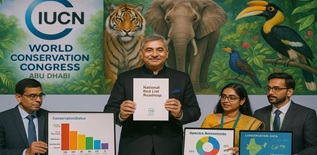08 December, 2025
National Red List Roadmap (India): Vision 2025–2030
Sun 12 Oct, 2025
Reference:
- India launched an ambitious roadmap named “National Red List Assessment Vision 2025–2030” at the IUCN World Conservation Congress held in Abu Dhabi, aimed at strengthening biodiversity conservation.
Why it is needed:
- India is one of the 17 mega-biodiverse countries in the world and hosts nearly 8% of global plant species and 7.5% of global animal species.
- Despite this, only 6.33% of plant species and 7.2% of animal species in India have been assessed under the global IUCN Red List so far.
- This initiative focuses on establishing a nationally coordinated system to scientifically assess and monitor the conservation status of the country’s flora and fauna.
- India has already ensured species protection through strong legal provisions under the Wildlife Protection Act, 1972, along with the recently revised CITES Appendices.
Global context:
- Under the IUCN Red List, 163,000 species have been assessed, of which around 28% are threatened with extinction.
- This underscores the urgency and relevance of India’s initiative, providing a concrete direction for biodiversity conservation.
Key objectives and approach of the roadmap:
This roadmap demonstrates India’s commitment to document biodiversity, assess threats, and develop evidence-based conservation plans.
| Key Point | Description |
| Goal & Duration | Vision 2025–2030: A comprehensive framework for the next five years (2025–2030). |
| Main Objective | Establish a science-based, inclusive, and nationally coordinated red-listing system to accurately assess species extinction risks. |
| Major Achievement | Publish national red data books for both flora and fauna by 2030. |
| Species Target | Comprehensive assessment of approximately 11,000 priority species by 2030 under this initiative. |
| Nodal Agencies | The project is led by the Ministry of Environment, Forest and Climate Change (MoEFCC), with Zoological Survey of India (ZSI) and Botanical Survey of India (BSI) as nodal agencies. Developed in collaboration with IUCN India. |
International Union for Conservation of Nature (IUCN)
- Established: 5 October 1948, Fontainebleau, France
- Headquarters: Gland, Switzerland
- Type: Non-governmental, international organization
- Objective: To ensure nature conservation and sustainable use of natural resources
- Note: In September 2025, IUCN officially recognized India’s first Dugong Conservation Reserve.


















